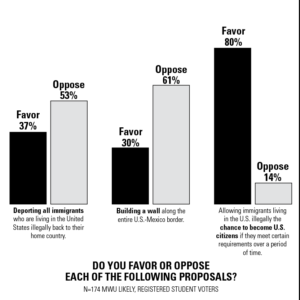 “We have to build a wall, folks.” Donald Trump, presidential candidate, said. “We have to build a wall.”
“We have to build a wall, folks.” Donald Trump, presidential candidate, said. “We have to build a wall.”
Students disagree.
Mass deportation of illegal immigrants. No way, Jose.
Give immigrants a chance to become legal citizens. Students are all for it. However the survey showed that immigration was not the most important problem in America. Ranking in ninth place out of 10 barely above national security, by 1.53 percent, and below the election/election reforms, by 1.06 percent.
“It’s more of a joke between the two,” Jeffery Hamon, exercise psychology sophomore, said. “We have other things wrong in our country that we should fix first than immigration.”
Others share by his view as well.
“The candidates are not trying to solve the problem but set attention on themselves.” | Dillion Morrison, social work freshman
“It’s for publicity, who can yell the loudest and make themselves look better.” | Braeden Alves, mechanical engineering freshman
“Immigration not really a problem. We’ve always had immigrants, we made America with immigrants.” | Nelson Alvarenga, exercise psychology junior
Though immigration is not considered the most important problem facing Americans today, talk of new immigration policies by both candidates are considered by voters as shown in CNN’s coverage of Donald Trump’s speech in Dallas on Sept. 14, 2015. The U.S.-Mexico land border is 1,989 miles stretching from San Diego, California to Brownsville, Texas. More than 50 percent of students oppose building a wall between the United States-Mexico border. Morrison compared the wall to the Great Wall of China which was used to close people out. Rosaria Jones, nursing freshman, opposed the wall saying there’s always a way around any wall.
 “It will be expensive to build a wall,” Alec John, environmental science sophomore, said. “Why not increase border control and security personnel?”
“It will be expensive to build a wall,” Alec John, environmental science sophomore, said. “Why not increase border control and security personnel?”
Another choice for what to do with illegal immigrants was to deport all illegal immigrants back to their home countries. Students answered with more than 50 percent opposing the thought. Alves does not consider it practical, because of how integrated the economy is with illegal immigrants. John gave an example that even though they may be living here illegally their homeland might be in a situation unstable for them to live with.
“We are becoming more united and more mix,” Jones said. “If you deport these people then you are getting rid of a part of America.”
Students also considered allowing illegal immigrants living in the U.S a chance to become citizens if they meet certain requirements over a period of time. This was strongly favored by survey takers with 79.38 percent agreeing. Alvarenga said if they been in the country long enough to know the language they’re basically a U.S citizen already. Making the test easier for immigrants is a proposal from Hamon, saying they have to know more about America than most Americans do.
“They are more American than someone who just came over,” Alves said. “As far as I’m concerned they are apart of the U.S even if they are not on paper.”
Others also agree:
“If immigrants are not selling drugs or murdering people then you should give them a chance.” | John
“It’s the way America is. It’s giving immigrants the freedom to choose their lives; we can’t deny their right to have a chance to live in America.” | Morrison
“Everyone should have a equal chance to a better life.” | Jones

But the options to solve the perceived immigration problem didn’t stop there. A common solution that John, Alvarenga, and Hamon suggested was that the government look at where most of the immigrants come from and help the country become safer so the immigrants can go home. Morrison considered lowering the fees applied to the process of citizenship and make the test harder since most people don’t have a lot of money to spare.
“There should be a grace period of x amount of time to take the test and get it done,” Alves said. “If they don’t take it then they should be deported.”
The Immigration and Nationality Act of 1952 defines an illegal immigrant as a person who is not a citizen or national of the United States. Immigration is divided into four government agencies: the U.S. Citizenship and Immigration Services, U.S. Department of State, U.S. Customs and Border Protection, U.S. Immigration and Customs Enforcement. Each agencies are part of the Department of Homeland Security.
The USCIS was created in 2003 and has the power to deny or authorize admission into the U.S. The USCIS also processes all immigrant and non-immigrant benefits including family-base petitions, employment-base petitions, asylum and refugee processing, naturalization. The ICE is the law enforcement agency which has the authority over illegal immigrant detention and removal.
There are ways for immigrants to become legal citizens. One way is to be married to a national-born citizen for five years and petition for a non resident legal alien card, a pink colored card. Another way is a job petition for the immigrant done mostly due to the skills the immigrant has that the company wants. After getting a pink card they can then apply for a permanent resident alien card better known as a green card. Each card process cost fees and require forms to be filled out.
Once immigrants are U.S. citizens they can petition for their mother, father, and any sibling they have. However this does not apply for any children, spouse, aunts or uncles, friends, etc. The test required to become a citizen involve the need to write, speak, read and understand the English language. They are required to have an interview with an immigration officer where they answer questions about U.S. history, politics and more. They are also required to pledge their allegiance to the flag in a ceremony officially welcoming them as U.S citizens.
RELATED STORIES
- In tight election, Trump squeaks by by Jeromy Stacy
- Hillary Clinton first female on major party ticket by Kelsey Purcell
- Jesse Brown makes uncontested bid for city council by Michelle Dickey
- Jesse Brown: the man behind the city council candidate by Michelle Dickey
- MSU alum Santellana wins mayoral seat by Dewey Cooper
- Student debaters talk political stereotypes by Brendan Wynne
- First student debate provides silver-lining for students by Dylan Hall
- Republicans and Democrats battle at podium by Chris Norrie
- Race relations impacting minorities votes in the fall election by Alyssa Mitchell
- The Electoral College: It’s who you’re really voting for by Emily Simmons
- Record levels of dissatisfaction fuel election trends by Garrett Hutchinson
- Medical records, tax returns and emails: Nothing is private when running for office by Jonathan Benyarko
- Students back national Republican trends on immigration by Stephen Gomez
- Third parties and the “wasted” vote by Caleb Sneath
- International view: America overlooks choice by Jeanette Perry
- Students don’t think national security is an important issue by Rodrigo Mireles
















